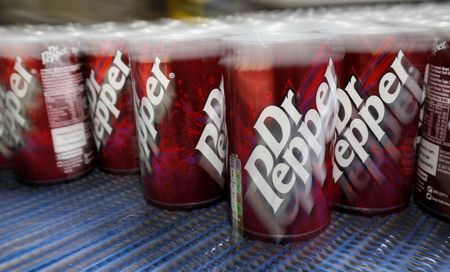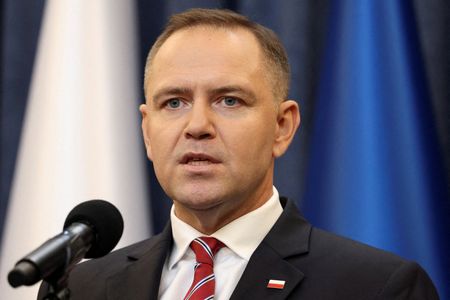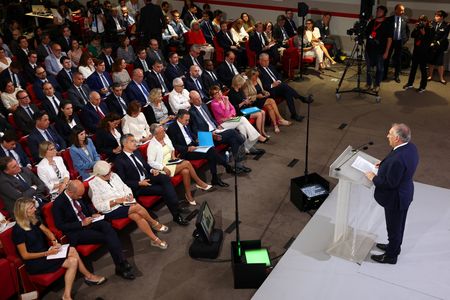By Marleen Kaesebier and John Revill
(Reuters) -U.S. tariffs and an appreciation in European currencies caused by dollar weakness have eroded companies’ top line performance in the second quarter, increasing pressure on them to relocate operations or put jobs into the United States.
Earlier this month, U.S. President Donald Trump put a 39% tariff rate on Swiss firms, prompting some to say they could consider moving operations stateside, adding to cases in the European Union and Britain facing tariffs of 15% or 10%.
The euro and the Swiss franc have jumped around 13% this year while sterling is up about 8% as uncertainty over Trump’s policies and concern about rising U.S. debt hit the dollar.
“The tariffs, the trade negotiations, etcetera, that’s where we’re seeing the bigger picture,” UBS equity strategist Sutanya Chedda said. “When we look at things like revenue misses … a lot of it has been due to the underestimation of the FX impact.”
Reuters reviewed more than 30 European corporate results for the second quarter and found that tariffs and currency moves were repeatedly mentioned as headwinds by companies.
Chedda and her team estimate Europe could suffer a 1.5% decline in revenues generated in developed markets this year compared to 2024 because of currency movements.
Deutsche Telekom said its second quarter earnings were around 400 million euros ($467.88 million) lower from converting primarily dollars into euros. The German telecoms giant depends heavily on its U.S. business T-Mobile.
Dutch paint maker AkzoNobel and Swiss freight forwarder Kuehne + Nagel both cut their full year guidance because of negative currency effects.
Meanwhile, to limit tariff exposure, several European companies say they will consider moving production to the U.S., including German premium carmakers, Swiss army knife maker Victorinox and Italian premium coffee maker Illycaffe.
Some Swiss companies are also considering moving operations within Europe to reduce exposure to tariffs or the Swiss franc. Swiss medical technology company Ypsomed signalled it could shift some production to Germany to avoid tariffs.
Swiss banks with major franc costs are also considering moving jobs.
Swiss private bank Julius Baer said its assets under management (AUM) in the first half of 2025 registered a negative currency impact of 37.7 billion Swiss francs.
With 53% of its costs in francs and 14% in euros, and 52% of its AUM in dollars, the bank is addressing the mismatch by shifting some operations to service centres in Spain and India, chief financial officer Evie Kostakis said last month.
Meanwhile wealth manager EFG International said in July a 10% fall in the dollar-franc exchange rate worsened its cost income ratio by 2.2%, and that it could potentially shift part of its cost base to help compensate.
Switzerland is still negotiating with Washington in the hope it can reduce its tariff burden. While uncertainty persists, companies such as aircraft manufacturer Pilatus have simply opted to halt exports to the United States.
($1 = 0.8549 euros)
(Reporting by Marleen Kaesebier and John Revill; additional reporting by Anastasiia Kozlova, Paolo Laudani, Simon Ferdinand Eibach, Dimitri Rhodes; Editing by Dave Graham and Alison Williams)











